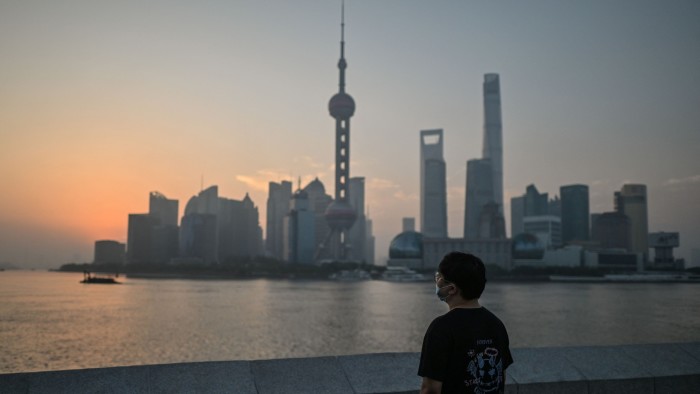Today’s agenda: French bond yields; Moscow’s missile threats; Canada’ border security moves; Musk and China; and London’s Smithfield market
Good morning. We begin in China where the bond market is grappling with fears that the economy is turning Japanese.
What happened: China’s long-term bond yields have fallen below Japan’s for the first time as investors are betting that the world’s second-biggest economy will become bogged down by the deflation that has long afflicted its neighbour.
A rally in 30-year Chinese government bonds has pushed their yield down to 2.24 per cent yesterday from 4 per cent in late 2020, as Beijing cuts interest rates to boost its flagging economy and Chinese investors pile into haven assets. Meanwhile, Japan’s long-term bond yields have risen above China’s to 2.31 per cent after being stuck for years below 1 per cent, as Tokyo normalises monetary policy after decades of deflation.
What does this mean: Chinese authorities are battling to try to support yields, warning that a sudden reversal in the market could threaten wider financial stability. But some investors believe that deflation has become too entrenched in the Chinese economy to be easily fixed through fiscal and monetary policy, meaning yields still have further to fall. Read the full report.
Here’s what else we’re keeping tabs on today and the weekend:
-
Economic data: France releases November inflation data and third-quarter gross domestic product figures. Germany has the unemployment rate for the month. The ECB releases results of its consumer expectations survey while the Bank of England publishes its financial stability report.
-
US: Black Friday, the day after Thanksgiving, and the traditional beginning of the Christmas shopping season.
-
Political events: In Italy, unions plan to stage a general strike in protest at the Meloni government’s budget plans. In the UK, the private members’ bill on assisted dying in England and Wales gets its second reading in parliament.
-
Elections: Parliamentary elections are held in Ireland today, Iceland tomorrow and Romania on Sunday.
-
G20: South Africa takes over the presidency of the group of leading economies.
How well did you keep up with the news this week? Take our quiz.
Five more top stories
1. France’s borrowing costs have risen above those of Greece for the first time, as investors fret that Michel Barnier’s government could fail to pass a belt-tightening budget. The 10-year yield on French government debt briefly reached 3.02 per cent in early trading yesterday, crossing above the 3.01 per cent yield demanded by lenders to Greece, before switching back. Read more on concerns about France’s political and fiscal outlook.
-
Explainer: France’s borrowing costs have surpassed those of Greece. But is the country really facing a Greek-style debt crisis?
-
Reality check: French MPs would do well to take heed of the real-world stakes of bond-market blow-ups, writes Katie Martin.
2. Russian President Vladimir Putin has pledged to use a new ballistic missile to turn Kyiv “to dust” in retaliation for Ukraine’s use of western-supplied long-range missiles to hit targets in Russia. He said in Kazakhstan yesterday that the Oreshnik missile, capable of destroying even highly protected underground sites, had entered serial production in Russia. His threat comes amid Moscow’s 11th large-scale attack on Ukraine’s energy sector this year.
3. Canada’s government is to bolster its investment in border security after Donald Trump threatened to impose steep tariffs over illegal immigration and drug smuggling across the US-Canada frontier. Prime Minister Justin Trudeau met Canada’s provincial leaders late on Wednesday to agree a united response to the US president-elect’s pledge this week. Here’s why the country faces a daunting challenge in policing the world’s longest border.
-
Tariff threats and investing: The reason shares don’t care about Trump waving his tariff club has nothing to do with whether or not he is serious but more with the fundamental nature of equities, writes Stuart Kirk.
-
Trump transition: The president-elect’s second administration risks being rife with potential conflicts of interests given the sprawling business and financial interests of several cabinet picks, warn ethics watchdogs.
4. Angola has removed the world’s largest diamond miner, Russian state-owned Alrosa, from its mines ahead of a visit by US President Joe Biden. President João Lourenço’s cabinet approved the sale of Alrosa’s stake in a state-owned Angolan miner yesterday because of sanctions on the Russian producer, state media said. The move suggests Luanda is moving closer to Washington after decades of ties with Moscow and Beijing.
5. Carmakers may be permitted to sell Prius-style hybrid models in the UK until 2035, as ministers consider ways to water down the country’s electric-vehicle sales regime, according to people with knowledge of the discussions.
Join us from December 4 to 6 at The Global Boardroom, where more than 100 experts including Luc Frieden, prime minister of Luxembourg, will tackle topics from the impact of a second Trump term to artificial intelligence, trade and climate change. Register for free.
The Big Read

Donald Trump is set to begin his second term in the White House surrounded by China hawks. However, one of the president-elect’s closest advisers has a much more complicated relationship with China: Elon Musk. The South African-born billionaire and self-styled “first buddy” to Trump has emerged as a potentially significant yet unpredictable player in the relationship between the world’s two superpowers.
We’re also reading . . .
-
Parental leave: Soumaya Keynes is in favour of policies to support staff taking time off to give birth and care for a newborn. But she asks: is it possible to go too far?
-
London’s Smithfield market: Traders and butchers predict the closure of the historic meat market will mean even fewer independent sellers feeding the city.
-
Marcos vs Duterte: The alliance between the Philippine president and his deputy has unravelled amid misuse of funds and disagreement over China.
Chart of the day
An under-reported story in the US is the stunning turnaround in the opioid epidemic that has been ravaging the country for more than a decade. The US Centers for Disease Control and Prevention recently published data showing that fentanyl deaths have been declining for 11 straight months, and now stand 20 per cent below their 2023 peak. John Burn-Murdoch looks at what is behind the decline.

Take a break from the news
To observers outside Europe, the continent can seem rather quaint. Its people stopped having children and possess only a few cute ancient assets worth stripping: châteaux, universities, handbags and football clubs. So how should the region respond now that it is no longer the global hegemon? The FT’s Simon Kuper considers the options.

Additional contributions from Harvey Nriapia
Source link









